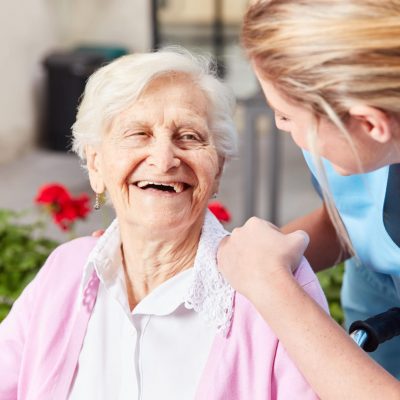Conversations with Liz
Improving the wellbeing of residents and staff in your Aged Care Facility
Improving the wellbeing of older people living in our aged care facilities, as well as the wellbeing of the staff who care for them, is a major part of ensuring we have happy residents, happy staff and happy families.
Māori health expert Mason Durie developed the whare tapa whā model of health in 1982. Encapsulating a Māori view of health and wellness, it has four dimensions: taha wairua (spiritual health), taha hinengaro (mental health), taha tinana (physical health) and taha whānau (family health).
Similarly the ASCOT tool suggests there are eight domains of wellbeing.
Four lower order needs (accommodation, food, safety and personal care) and four higher order needs (social interaction, occupation, control over daily life, and dignity).
As with the whare tapa whā model of health all these domains need to be addressed for a resident to feel life satisfaction, optimism, self-esteem, feeling in control, having a purpose and a sense of belonging and support

Do your assessment tools and care plans reflect these domains?
How do you know and understand the needs of your residents?
Research completed by the Institute for Health & Aging (IHA) at the Australian Catholic University (ACU) in Sydney found that up to 50 % of residents living in aged care facilities suffer from depression but only half are diagnosed or treated.
- Improve mood and combat anxiety, depression and loneliness
- Build resilience and coping mechanisims
- They improve or maintain physical fitness
- Reduce falls
- Improve the quality of sleep
- Reduce joint pain
- Help with forming of new friendships
- Relaxation
- They improve central nervous system processing and reaction time.
- Improves staff engagement
- Improves staff morale
It is important that staff and residents are aware and are reminded of the daily activity programme. Creating a sense of fun, excitement, or competition for upcoming events is a great way to encourage resident participation.
Diversional therapy/activity plans should be discussed at your Circle of Care meetings also known as Multidisciplinary Team Meetings.
Residents’ meetings and surveys allow your residents an opportunity to discuss what activities they enjoy and changes they might like to the current programme.
Many different approaches are used to improve wellbeing and I have provided links to some web sites that may be useful.
Māori health models – Te Whare Tapa Whā | Ministry of Health NZ
269568_0914_BL1263_HR (nsw.gov.au)
Mental-wellbeing-in-care-homes.pdf (nice.org.uk) https://www2.health.vic.gov.au/Api/downloadmedia/%7BC9F13A53-8D75-46E5-9298-2802491315F6%7D
https://lx.iriss.org.uk/content/ascot-adult-social-care-outcomes-toolkit
Register for our upcoming webinar with Auditor and Registered Nurse Liz Lear
Free handover report template for all those who register and attend the webinar
When – Wednesday 4th August 11am





